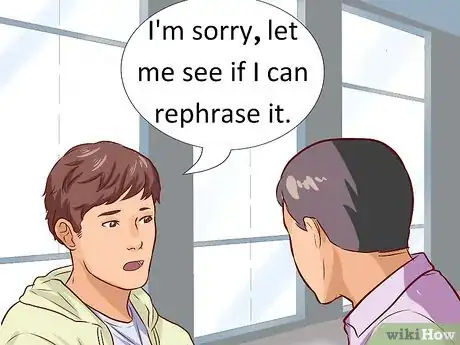This article was co-authored by Rebecca Kason, PsyD. Dr. Rebecca Kason is a Licensed Clinical Psychologist licensed in both New York and New Jersey. She specializes in adolescent mental health, dialectical behavior therapy, and cognitive-behavioral therapy. Dr. Kason treats clients struggling with emotional dysregulation, behavioral disorders, interpersonal difficulty, family conflict, anxiety, depression, and phobias. She holds a Bachelor's degree in Psychology from The University of Delaware and a Master's degree in Applied Psychology and a Doctor of Psychology (PsyD) in Clinical Psychology from Long Island University. Dr. Kason completed an APA accredited internship at Mount Sinai Services. She is a member of the American Psychological Association and Association for Behavior and Cognitive Therapy.
There are 15 references cited in this article, which can be found at the bottom of the page.
wikiHow marks an article as reader-approved once it receives enough positive feedback. In this case, 100% of readers who voted found the article helpful, earning it our reader-approved status.
This article has been viewed 252,606 times.
Let's be real, we can all be a little stubborn sometimes. Standing your ground can actually be a good thing, but if it feels like you're never willing to compromise or back down, you might be wanting to change. If you're not sure how, don't worry! We've put together some easy, practical tips to help you stop being stubborn.
Steps
Using a Practical Approach
-
1Listen to the other side of the story. You may agree with some of the things you hear, and disagree with others. This gives you a chance to hear things you may not have heard before, and also increases your chances to reach an agreement. When both parties listen to each other, it makes things easier for everyone.[1]
- If you are filling your head with all the reasons to say “no” as the person is talking, you are not actively listening. If it is difficult for you to listen, say to the other person, “Okay, I’m listening to what you have to say.” This will force you to pause and focus on the person talking.
- Maintain good eye contact. This will help you stay focused and also will convey your interest in hearing what the other person has to say.
- Do not interrupt the person talking. Instead, wait until he is done to address the matter. Repeat back in similar wording what you heard him say. Each time you do this it builds your credibility as an active listener.[2]
- If the person talking is upset, happy, or passionate about what he is saying you can reply, “It sounds like you are really excited about this opportunity. I can see why this is so important to you.” People like to be heard and listened to. When you correctly repeat back to people what you heard, they know you have been listening.
-
2Remind yourself that you are not always right. While listening to someone talk, you may think everything he says is wrong because you know "the right way." There is a distinction between facts and opinions. Your opinion is not the only one that matters, nor is all your knowledge necessarily correct. You have to accept that you learn something new every day, even if it overwrites something you thought you already knew.[3]
- You are entitled to have an opinion, but you cannot expect others to always agree with you. Repeating your opinion louder, or more often, or with judgmental slurs attached, will not convince anyone to agree with you. Everyone is entitled to their opinion.
- No one likes a know-it-all. If maintaining relationships with family, friends and business is important, you must consider your likability.[4]
Advertisement -
3Build trust in others by starting with small steps. Your stubbornness might be attributed to an overall mistrust of others. Most people are not going to take advantage of you the second you stop fighting tooth-and-nail for your objectives. For the ones who do, it becomes apparent very quickly and you can distance yourself. Remember, these types of people are the exception not the norm.[5]
- There are ways to build your ability to trust others. Start with small steps that lead to larger ones. For example, if you think someone is incapable of being responsible, allow him to pick up your dry cleaning. This is a low-risk activity, but it will still allow you to build trust. Once the person demonstrates he is reliable, you can allow him to do more important tasks. Each time the person is successful your trust in him will grow.
- Even if someone forgets to do something for you, it doesn’t mean they can’t be trusted. Give him a second chance to earn your trust. You would appreciate the same concession.
-
4Keep an open mind by reserving judgement. Enter any discussion and situation with an open, neutral mindset, without prejudice, or judgement. Approach with the attitude that you are willing to hear what someone has to say so you can make a fair decision, rather than a rash decision. Considering everyone’s input prevents closing off the possibility for a positive outcome.[6]
- Prevent yourself from jumping to a negative conclusion by using visualization techniques.[7] For example, close your eyes and envision a box filled with all the negative things you believe about the person or the event you are supposed to attend. Picture yourself closing the box and putting a lock on it and setting it to the side. Open your eyes and take a step forward symbolically moving away from your stubbornness. This should help you start the conversation with an open mind.
- Focus on the positive feeling that results from a good outcome and let that motivate you through the situation.
-
5Be humble. Don't always assign people less value than yourself. Think about everyone as being equal. It is okay to be confident and have healthy self-esteem, but over doing it can make you appear stubborn and closed-minded, not to mention snobby, self-centered and even mean.
- To be humble you need to approach every situation from the perspective that you are grateful for what you have. Don't boast about your accomplishments. Be appreciative for what you have and for the people in your life. If you never lose sight of this and uphold a high level of care for others, you will see your stubbornness decrease.
- Humility requires you to hold a modest opinion of yourself rather than an inflated one. For example, if you hold an advanced college degree, don’t think less of someone who doesn’t have one. There are all sorts of reasons why people don’t go to college, and many of these people might be more successful than you.
-
6Realize that being stubborn is good in some cases. In an instance when you are certain you are right or are defending something of value, being stubborn is appropriate. Also, in a case when the decision is yours to make and the consequences greatly impact you, your stubbornness will serve you well. Given the right situation, stubbornness is useful. It is when it gets out of control and negatively affects you and those around you that you must find a way to temper it.
- If you or your attorney are fighting for your rights, being stubborn is an asset.
- If you need to have a medical procedure approved and you are getting push-back from your insurance company, being stubborn might save your life.
Developing Negotiating Skills
-
1Build rapport to lessen tension. Don’t use stubbornness to get what you want, instead learn the essentials of negotiation so you can compromise, cooperate and collaborate. You will get what you want in a more effective and professional manner. Building rapport is the first step. People tend to let down their guard with those who share common interests. If you put your stubbornness aside and relate to people, they will respond in a positive way.[8]
- Find common ground with people by simply noticing a photograph or piece of art on the wall or on the person’s desk and say, “That is a great shot. It looks like a place I saw in New Mexico. Where did you take that?”
- To find common ground with people steer toward conversations about the weather, pets and children. People respond to people they can relate to. Find a subject matter the person can relate to and talk about it. Bringing the subject up again when you are leaving is a nice way to end the conversation.
- You will be asked questions that might make you feel defensive. Maintain your composure and say, “In the hope of resolving this issue, let me try to answer that question without getting defensive.” Saying it out loud will remind you to focus on continuing to build rapport.
- You might feel competitive toward the other person, so remember that good sportsmanship is relevant to any competitive situation.[9]
- Maintain a professional, friendly tone throughout the conversation.
-
2Decrease misunderstandings to increase resolution. Make it your goal to understand what the other person is saying and what they want. If something doesn’t make sense to you, ask for clarification. Next, express your desires in a way that will help the other person understand what you want. Once both parties understand each other, it will be easier to mold a positive outcome.
- If there is something that you don’t understand say, “I don’t know if I’m understanding why you need to use the car next week. Are you saying that you won’t be able to make it to work, or will you get fired because of it?”
- You may need to apologize for a misunderstanding. For example you might say, “I am sorry I created a misunderstanding. Let me see if I can rephrase it.”
-
3Build legitimate support for your position. Your stubborn demands have probably lacked rational support if stubbornness has been your main tactic for controlling a situation. Others have probably given up trying to resolve an issue with you because you continually force your position on to them.
- Saying, “Because I said so,” in a negotiation isn't acceptable and works against reaching an agreement. You will need to support your position with evidence that will help justify what you want. For example, if your significant other wants you to go with her to a work party and you don’t want to you could say, “I know it seems like I’m just being stubborn, but the reason I don’t want to go to the party is because I don’t know anyone, and I would rather you go with your friends and have fun. You won’t have to worry about whether I’m having fun or not. So go, I want you to have fun.”
-
4Facilitate and celebrate agreements. If you approach every situation with the intent of saying “no,” it will hinder an agreement. Conflicts are resolved much quicker if you start with an attitude of, “How can we make this work?” You aren’t giving up any power by using this approach. In fact, arriving at a solution in an expedient manner is a powerful accomplishment.[10]
- If you have been at odds with a roommate and you resolve a longstanding issue say, “I’m so happy we solved this problem. Let’s go out for coffee and dessert. My treat.”
- Whenever you have had a struggle with someone, always acknowledge his willingness to work on a solution. For example say, “I really appreciate you working with me to get this issue resolved. I hope we can put it behind us now.”
- Acknowledge when you have put your stubbornness aside and it has made a difference. For example say, “I really tried to not be stubborn and I think it helped. Do you?” You are not admitting a weakness. Making a change is a show of strength.
-
5Agree to disagree. There will be times when you won’t be able to resolve a conflict. If you make every effort to fully participate, then that is all that you can do. You may want to make additional attempts at a resolution. Unfortunately, there are times when you must accept it and move on.
- You can always take a break from the action to allow yourself and the other person to think, cool down, and process the potential outcomes.
- Sometimes the best outcome is to understand that you will never understand. This will help you mentally get past the issue.
Analyzing Your Stubbornness
-
1Explore and identify the losses of your life. Stubbornness can be a reaction to losing someone or something in your life. You may be self-protecting against any further loss because the initial loss was extremely painful. Things, people, or family status may have been pulled out from under you. Subconsciously you think if you hold your ground on everything, you won’t get hurt.
- The root of a person’s stubbornness varies from person to person. Possible reasons include: feelings of inferiority; there may be a secret being protected; a desire to get attention from others; a person is afraid to give up power.[11]
- Situations that may trigger a person’s stubbornness include: playing a competitive game; a schoolmate might be flunking out of school and doesn’t want anyone to know so he refuses to talk about his classes; a person gets into a debate over something and takes a side just to antagonize everyone involved; a roommate refuses to share responsibility in an issue over expenses.
- The world filled with stubbornness you are trying to create is not healthy. You will eventually end up feeling isolated, depressed and may suffer other psychological challenges.[12]
- Did you experience a loss of control when a parent left, a spouse was killed, or your dream job was eliminated? Rather than remain stubborn, learn new and healthier coping strategies including but not limited to: participate in healthy activities that require you to open up, learn about the grieving process,[13] or meditate.[14]
- Are you passive aggressive because someone in your life always told you what to do and you didn’t like it? Now, when someone asks you to do something you say you will, then you stubbornly drag your feet to make the other person angry. Follow through on your promises as passive aggressive behaviors will undermine and deteriorate any relationship.[15]
-
2Ask yourself why you won’t let go of being right. Insecurity drives a lot of human behavior and can lead to anxiety and depression.[16] Do you fear others will think you are uneducated, a low-achiever, or somehow less of a human being if you show your vulnerabilities? Believing you are right when it is obvious that you are not, will ultimately reinforce your insecurities.
- Admit that you are wrong when it is justified. You will see it is not the end of the world. In fact, you will feel the relief and begin to understand that being stubborn takes a toll on your thoughts, emotions and relationships.
-
3Determine what you hope to gain by being stubborn. Being overly stubborn creates a barrier between you and others. Are you pushing people away? Does the barrier make you feel safe? What are the possible pay-offs, and are the results of your actions healthy?
- Is your stubbornness working against you? Do you want stability and togetherness, yet all your actions push others away? The answer is: it isn’t working for you.
- Be honest with yourself and write a list of the things you hope to gain from being stubborn. For example, do you think it will make you feel superior to others, that it will keep life from changing, or that you want to prove that no one can tell you what to do? Expecting these outcomes is not realistic. Examining your flawed thinking is essential for change to happen.
- Write a second list of the things you can do to stop being stubborn, and create the unshackled life you want to live.
-
4Seek help if you are struggling. It takes bravery and courage to ask for help. If you are struggling with controlling your stubbornness, contact a trusted source to talk about getting help. There are resources available to you through a private provider such as a counselor or doctor. Talking with someone will help you sort out your struggles and develop an effective approach to handle anything.[17]
- If you are becoming increasingly isolated, call a counselor or doctor to make an appointment. If you have suffered a great loss, being stubborn can be considered normal for a limited period of time. However, this may be a sign that you may be suffering from unresolved grief, therefore grief counseling will help.[18]
- Art therapy is also available and can be extremely beneficial.[19]
Expert Q&A
-
QuestionCan stubbornness ruin a relationship?
 Rebecca Kason, PsyDDr. Rebecca Kason is a Licensed Clinical Psychologist licensed in both New York and New Jersey. She specializes in adolescent mental health, dialectical behavior therapy, and cognitive-behavioral therapy. Dr. Kason treats clients struggling with emotional dysregulation, behavioral disorders, interpersonal difficulty, family conflict, anxiety, depression, and phobias. She holds a Bachelor's degree in Psychology from The University of Delaware and a Master's degree in Applied Psychology and a Doctor of Psychology (PsyD) in Clinical Psychology from Long Island University. Dr. Kason completed an APA accredited internship at Mount Sinai Services. She is a member of the American Psychological Association and Association for Behavior and Cognitive Therapy.
Rebecca Kason, PsyDDr. Rebecca Kason is a Licensed Clinical Psychologist licensed in both New York and New Jersey. She specializes in adolescent mental health, dialectical behavior therapy, and cognitive-behavioral therapy. Dr. Kason treats clients struggling with emotional dysregulation, behavioral disorders, interpersonal difficulty, family conflict, anxiety, depression, and phobias. She holds a Bachelor's degree in Psychology from The University of Delaware and a Master's degree in Applied Psychology and a Doctor of Psychology (PsyD) in Clinical Psychology from Long Island University. Dr. Kason completed an APA accredited internship at Mount Sinai Services. She is a member of the American Psychological Association and Association for Behavior and Cognitive Therapy.
Licensed Clinical Psychologist Yes, it can! You should always keep in mind that flexibility is a skill that needs to be practiced and that it is rewarding, especially in intrapersonal relationships. Remember to strike a balance in a way that you both end up satisfied.
Yes, it can! You should always keep in mind that flexibility is a skill that needs to be practiced and that it is rewarding, especially in intrapersonal relationships. Remember to strike a balance in a way that you both end up satisfied. -
QuestionHow can I become more mentally flexible?
 Rebecca Kason, PsyDDr. Rebecca Kason is a Licensed Clinical Psychologist licensed in both New York and New Jersey. She specializes in adolescent mental health, dialectical behavior therapy, and cognitive-behavioral therapy. Dr. Kason treats clients struggling with emotional dysregulation, behavioral disorders, interpersonal difficulty, family conflict, anxiety, depression, and phobias. She holds a Bachelor's degree in Psychology from The University of Delaware and a Master's degree in Applied Psychology and a Doctor of Psychology (PsyD) in Clinical Psychology from Long Island University. Dr. Kason completed an APA accredited internship at Mount Sinai Services. She is a member of the American Psychological Association and Association for Behavior and Cognitive Therapy.
Rebecca Kason, PsyDDr. Rebecca Kason is a Licensed Clinical Psychologist licensed in both New York and New Jersey. She specializes in adolescent mental health, dialectical behavior therapy, and cognitive-behavioral therapy. Dr. Kason treats clients struggling with emotional dysregulation, behavioral disorders, interpersonal difficulty, family conflict, anxiety, depression, and phobias. She holds a Bachelor's degree in Psychology from The University of Delaware and a Master's degree in Applied Psychology and a Doctor of Psychology (PsyD) in Clinical Psychology from Long Island University. Dr. Kason completed an APA accredited internship at Mount Sinai Services. She is a member of the American Psychological Association and Association for Behavior and Cognitive Therapy.
Licensed Clinical Psychologist Start by categorizing your wants and needs in degrees of importance. When someone asks you to be more flexible, evaluate your need. If it's small, use this opportunity to practice flexibility and to give in. If your need is large, set boundaries and assert yourself, but remember to not dismiss the other person's need entirely.
Start by categorizing your wants and needs in degrees of importance. When someone asks you to be more flexible, evaluate your need. If it's small, use this opportunity to practice flexibility and to give in. If your need is large, set boundaries and assert yourself, but remember to not dismiss the other person's need entirely.
Warnings
- Being stubborn can cost your relationships, jobs, opportunities and even your life if you refuse to seek medical treatment when it is necessary.⧼thumbs_response⧽
- You must gain perspective about the consequences of your behaviors before you can change. Your behaviors affect other people and you have a responsibility to treat others in the way and manner you expect to be treated.⧼thumbs_response⧽
- Know that if your personality has a certain twist of stubbornness, then that is who you are. However, you can learn to manage it so it will not work against you.⧼thumbs_response⧽
- It is never too late to apologize to get yourself out of a predicament caused by your unwillingness to bend.⧼thumbs_response⧽
References
- ↑ http://www.wsj.com/articles/how-active-listening-makes-both-sides-of-a-conversation-feel-better-1421082684
- ↑ http://www.ideafit.com/fitness-library/developing-active-listening-skills
- ↑ Rebecca Kason, PsyD. Licensed Clinical Psychologist. Expert Interview. 12 August 2021.
- ↑ http://www.wsj.com/articles/SB10001424052702303725404579461351615271292
- ↑ Rebecca Kason, PsyD. Licensed Clinical Psychologist. Expert Interview. 12 August 2021.
- ↑ Rebecca Kason, PsyD. Licensed Clinical Psychologist. Expert Interview. 12 August 2021.
- ↑ https://www.questia.com/library/journal/1G1-144014458/guided-imagery-as-an-effective-therapeutic-technique
- ↑ Rebecca Kason, PsyD. Licensed Clinical Psychologist. Expert Interview. 12 August 2021.
- ↑ http://www.ncbi.nlm.nih.gov/pmc/articles/PMC1279847/
- ↑ Rebecca Kason, PsyD. Licensed Clinical Psychologist. Expert Interview. 12 August 2021.
- ↑ http://drlwilson.com/ARTICLES/STUBBORN.htm
- ↑ http://www.ncbi.nlm.nih.gov/pmc/articles/PMC2756979/
- ↑ http://psychcentral.com/lib/the-5-stages-of-loss-and-grief/
- ↑ http://www.ncbi.nlm.nih.gov/pubmed/1609875
- ↑ https://www.psychologytoday.com/blog/evolution-the-self/200806/afraid-rage-the-origins-passive-aggressive-behavior
- ↑ http://www.ncbi.nlm.nih.gov/pmc/articles/PMC2741157/
- ↑ http://www.wsj.com/articles/SB10001424127887323475304578503584007049700
- ↑ http://www.counseling.org/publications/frontmatter/72887-fm.pdf
- ↑ http://www.ncbi.nlm.nih.gov/pmc/articles/PMC1071468/
About This Article
Being overly stubborn can harm your professional opportunities or social relationships, but you can avoid this by learning how to listen to others and how to compromise. Try to approach every discussion you have with an open mind, which will help you include other people’s views in your decisions or actions. You can show others that you’re listening to them by maintaining eye contact during your conversation and not interrupting them, because speaking over another person is a sign that you don’t respect their opinion. As you listen to the other person, tell yourself that they’re just as entitled to their opinion as you, even if you don’t agree with it. If you’re struggling to understand what they’re saying, ask them questions to clarify what they’re saying to show that you’re trying to see their point of view. To avoid making conflicts worse, explain to them that your main concern is reaching an agreement, which will show them that you want to compromise. For tips from our co-author on how to identify what may be causing your stubbornness, read on!












































































